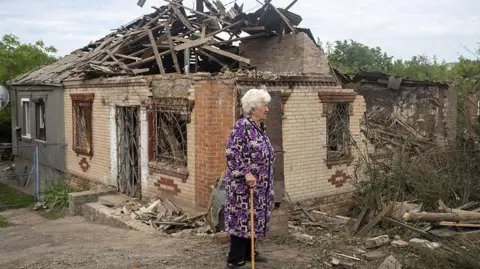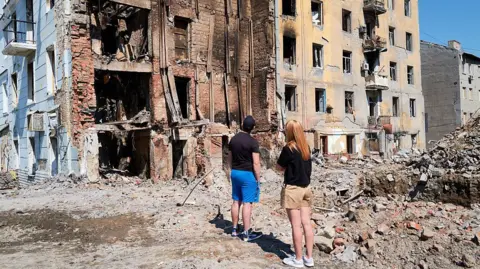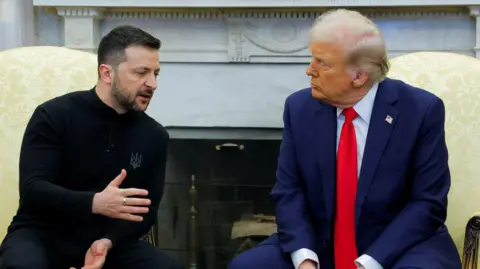Reporting from Kyiv
 Anadolu via Getty Images
Anadolu via Getty ImagesDays before meeting Vladimir Putin in Alaska, Donald Trump referred to what he called “land swaps” as a condition for peace.
For Ukrainians, it was a confusing turn of phrase. What land was to be swapped? Was Ukraine to be offered part of Russia, in exchange for the land Russia had taken by force?
As Volodymyr Zelensky prepares to travel to Washington on Monday to meet Trump, there is likely no “swap” element to the US president’s thinking.
Instead, he is reportedly planning to press Zelensky to surrender the entirety of the eastern Ukrainian regions of Donetsk and Luhansk in return for Russia freezing the rest of the front line – a proposal put forward by Putin in Alaska.
Luhansk is already almost entirely under Russian control. But Ukraine is estimated to have held onto about 30% of Donetsk, including several key cities and fortifications, at a cost of tens of thousands of Ukrainian lives.
Both regions – known together as Donbas – are rich in minerals and industry. To surrender them to Russia now would be a “tragedy”, said the Ukrainian historian Yaroslav Hrytsak.
“This is Ukrainian territory,” Mr Hrytsak said. “And the people of these regions – particularly the miners – played a huge role in the strengthening of the Ukrainian identity.”
The region had also produced “famous politicians, poets and dissidents”, he said. “And now refugees who will not be able to return home if it becomes Russian.”
At least 1.5 million Ukrainians have fled the Donbas since Russian aggression began in 2014. More than three million are estimated to be living under Russian occupation. A further 300,000 are estimated to be in the parts where Ukraine still has control.
In areas closest to the front line, life is already a dangerous struggle. Andriy Borylo, a 55-year-old military chaplain in the badly hit city of Sloviansk, said in a phone interview that shells had landed next to his house over the weekend.
“It is a very difficult situation here,” he said. “There is a feeling of resignation and abandonment. I don’t know how much we have the strength to endure. Someone has to protect us. But who?”
Mr Borylo had been following the news from Alaska, he said. “I put this on Trump, not Zelensky. But they are taking everything from me, and it is a betrayal.”
Zelensky has consistently said Ukraine would not hand over the Donbas in exchange for peace. And confidence in Russia to abide by any such arrangement – rather than simply use the annexed land for future attacks – is low.
For that and other reasons, about 75% of Ukrainians object to any formal cessation of land to Russia, according to polling by the Kyiv International Institute of Sociology.
 Getty Images
Getty ImagesBut Ukraine is also deeply fatigued by war. Hundreds of thousands of soldiers and civilians have been killed and wounded since the full-scale invasion began. People are craving an end to suffering, particularly in the Donbas.
“You ask about the surrender of the Donetsk region, well, I measure this war not in kilometres but in human lives,” said Yevhen Tkachov, 56, an emergency rescue worker in the Donetsk city of Kramatorsk.
“I’m not ready to give tens of thousands of lives for several thousand square kilometres,” he said. “Life is more important than territory.”
For some, this is what it comes down to in the end. Land versus life. It leaves President Zelensky “at a crossroads with no good route in front of him”, said Volodmyr Ariev, a Ukrainian MP from the opposition European Solidarity party.
“We don’t have enough forces to continue the war for an unlimited time,” Ariev said. “But if Zelensky were to concede this land it would be not only a breakdown of our constitution, it could have the hallmarks of treason.”
And yet, it is not clear in Ukraine by what mechanism such an agreement could even be reached. Any formal handover of the nation’s territory requires the approval of the parliament and a referendum of the people.
More likely would be a de-facto surrender of control, with no formal recognition of the territory as Russian. But even in that event, the process is not well understood, said Ukrainian MP Inna Sovsun.
“There is no real understanding as to what the procedure should be,” she said. “Does the president simply sign the agreement? Does it have to be the government? The parliament? There is no legal procedure set up because, you know, the constitution writers didn’t think about this.”
Things may become more clear after Zelensky speaks with Trump in Washington on Monday – the Ukrainian leader’s first visit to the White House since a disastrous clash in the Oval Office in February. Amid the unhappiness left by the Alaska summit, there was one possible glimmer of good news for Ukraine.
Trump appeared to reverse his position on security guarantees after the summit, suggesting he was ready to join Europe in offering Ukraine military protection from future Russian attacks.
 Reuters
ReutersFor Ukrainians, polling shows security guarantees are an absolutely vital part of any potential agreement on territory or anything else.
“People in Ukraine will accept various forms of security guarantees,” said Anton Grushchetsky, the director of Kyiv’s International Institute for Sociology, “but they require them.”
For Yevhen Tkachov, the emergency worker in Kramatorsk, exchange of territory could only be considered with “real guarantees, not just written promises”.
“Only then, more or less, I am in favour of giving Donbas to Russia,” he said. “If the British Royal Navy is stationed in the port of Odesa, then I agree.”
As various paths to peace are floated and discussed, sometimes in the deal-making style preferred by President Trump, there is a risk of losing sight of the real people involved – people who have already lived through a decade of war and who may stand to lose even more now in exchange for peace.
Donbas was a place full of Ukrainians from all different walks of life, said Vitalii Dribnytsia, a Ukrainian historian. “We are not just talking about culture, about politics, about demographics, we are talking about people,” he said.
Donetsk might not have the cultural reputation of somewhere like Odesa, Mr Drinytsia said. But it was Ukraine. “And any corner of Ukraine, regardless of whether it has some great cultural significance or not, is Ukraine,” he said.



